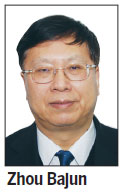Turning point in constitutional reform
Updated: 2014-02-11 07:00
By Zhou Bajun(HK Edition)
|
|||||||||
On Jan 31, the first day of the Year of the Horse, the Secretary for Justice Yuen Kwok-keung discussed the ongoing public consultation on arrangements for the Legislative Council election in 2016 and Chief Executive (CE) election in 2017. Yuen noted that the SAR government had to "hope for the best and prepare for the worst".
Only two days earlier, on Jan 29, Yuen had written an article titled "Civic Nomination and Nomination by Political Parties" in local Chinese and English newspapers. While the tone of the article was quite mild, it nevertheless stressed that neither civic nomination nor nomination by political parties are consistent with the Basic Law. Yuen reiterated that any proposal that bypasses the Nominating Committee (NC) or undermines its authority will also be inconsistent with the Basic Law.
We have witnessed a turning point in Hong Kong's recent constitutional development. After almost two months' of consultation, the government had consistently maintained a stance of "impartiality". Even on Jan 20, the Secretary for Constitutional and Mainland Affairs Raymond Tam reiterated that in the next three months of the public consultation, the government "will continue to adopt a very open and listening mode to all sorts of proposals". But as Hong Kong people were enjoying the Lunar New Year festivities, the government suddenly changed its approach - from "not taking any concrete positions on any particular proposal" to expressing views against "civic nomination or nomination by political parties". The government, therefore, ended its stance of "impartiality".
Why have the authorities made such a big change in their handling of the public consultation? I guess one of the considerations the CE and his team had to make is that if they "continue to adopt a very open and listening mode to all sorts of proposals" they won't have any concrete proposals on the two elections - particularly election of the CE by universal suffrage in 2017. Moreover, after the first stage of the public consultation, the CE might face many difficulties submitting a report to the central government on the so-called five stages on legal procedures for the two elections.

In his article, Yuen said: "Civic nomination and nomination by political parties are not the only means to achieve universal suffrage. The community should consider approaching the issue of nomination in a pragmatic manner and in a way consistent with the Basic Law." Despite this, the opposition camp immediately condemned the government. Because of Hong Kong's current political situation, Yuen explained that this was why the government still had to "hope for the best and prepare for the worst".
Also on the first day of the Year of the Horse, Chief Secretary for Administration Carrie Lam said: "As far as the government is concerned, constitutional development is one of our major priorities. And I hope that we will continue to talk and establish a consensus for us to achieve jointly this common aspiration to have universal suffrage in the selection of the CE in 2017."
It seems the government is still very determined to overcome any difficulties in adopting universal suffrage. However, after facing irreconcilable differences between the opposition and the "Love Nation, Love Hong Kong" camps, how can the government meet such difficult aspirations?
Meanwhile, Raymond Tam suggested on local radio that a mechanism might be set up to encourage greater communication between the city's opposition groups and the central government. But Democratic Party Chairwoman Emily Lau said the opposition should talk with the Hong Kong government rather than with the central government. Lau must have forgotten that in 2010 she and her colleagues from the Democratic Party entered the Liaison Office to talk with central government officials to reach a breakthrough on arrangements for two elections in 2012. According to the Basic Law, it is the central government rather than the HKSAR Government that has the final say in the city's constitutional development. If the opposition camp defies the central government now there will be no possibility of reaching a deal on universal suffrage.
The author is a veteran current affairs commentator.
(HK Edition 02/11/2014 page9)